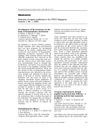Downregulation of Nuclear Factor-KappaB Activation in Human Keratinocytes by Melanogenesis Inhibitors
May 2004
in “
International Journal of Cosmetic Science
”

TLDR Melanogenesis inhibitors like kojic acid and niacinamide can reduce inflammation and pigment production in skin cells.
The study investigated the effect of melanogenesis inhibitors on the activation of nuclear factor-kappaB (NF-kB) in human keratinocytes. Researchers used human HaCaT keratinocytes transfected with a plasmid containing a NF-kB responsive element to measure the activity of NF-kB through the release of secretory alkaline phosphatase (SEAP) as a transcription reporter. Melanogenesis inhibitors such as niacinamide, kojic acid, hydroquinone, resorcinol, arbutin, and glycolic acid were pre-incubated with the cells for 3 hours before UVB irradiation. Kojic acid (IC50 60 μM) was the most potent inhibitor of UVB-induced NF-kB activation, followed by niacinamide (IC50 540 μM). Both kojic acid and niacinamide significantly reduced NF-kB binding and the secretion of interleukin-6 (IL-6), a melanotrophic factor, after UV radiation. The results suggest that melanogenesis inhibitors may act by modulating the synthesis of melanotrophic factors in keratinocytes.



